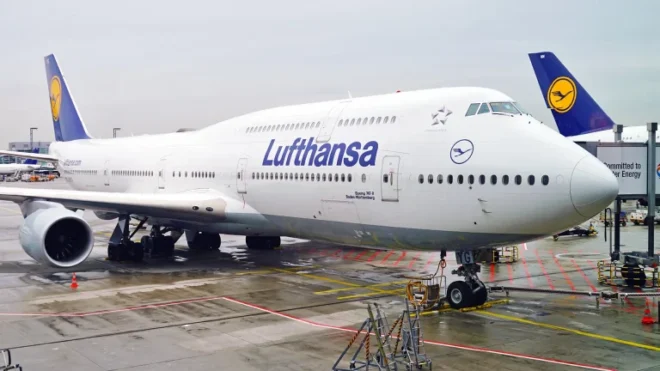
A Nightmare in Frankfurt: Why I Won’t Be Flying Lufthansa Again
There’s a certain thrill that comes with travel—the scent of adventure, the anticipation of seeing new places or returning to familiar ones, the gentle hum of the airport that somehow signals movement and progress. But not all travel tales are happy ones. Some are riddled with chaos, confusion, and a deep sense of being utterly abandoned by the very systems meant to guide and protect you. My recent experience flying with Lufthansa was just that. A nightmare. One that unfolded hour by painful hour in Frankfurt Airport, and one that has left me with no desire to ever fly Lufthansa again.
The Beginning of the Collapse
My journey began smoothly enough in New York. The check-in was efficient, the staff polite, and boarding was uneventful. The plane—a Boeing 747—was modern and clean, and I settled into my aisle seat with relative optimism. I was heading to Athens via Frankfurt for a family reunion I’d been anticipating for over a year. Little did I know that Lufthansa, one of Europe’s most reputable airlines, would turn this dream into a logistical horror show.
The trouble started somewhere over the Atlantic. About halfway through the flight, we were informed that due to a “technical issue” with the inbound plane to Frankfurt, connecting flights were likely to be delayed. The flight attendants remained vague and unemotional. No one offered specifics, only that “ground staff would assist you in Frankfurt.” They spoke the way one reads a poorly translated instruction manual: lifeless and bafflingly robotic.
Frankfurt: A Scene from a Disaster Film
Landing at Frankfurt Airport felt like stepping into a war zone. The terminal was bursting with travelers, many visibly distraught, and barely any Lufthansa personnel were to be seen. What should have been a quick transfer turned into a Kafkaesque labyrinth. My flight to Athens was canceled—no notice, no message, no email. Just gone from the departure screens.
The rebooking line at the Lufthansa transfer desk stretched on endlessly, snaking through the terminal like a sad parade of hope and frustration. I stood in it for five hours. Five. Hours. There were no refreshments offered. No vouchers. Not even a formal apology. Some passengers collapsed onto the cold tile floor, children cried, elderly travelers leaned on their trolleys, and tempers flared. Tensions escalated as rumors circulated: pilots on strike, IT systems failing, a shortage of staff due to a sudden walkout.
By the time I reached the desk, I was exhausted, hungry, and desperate. The agent—clearly overwhelmed and under-supported—told me the next available Lufthansa flight to Athens would be two days later. No explanation, no assistance with alternate routes, just a blunt “you’ll have to wait.” I asked if they could reroute me through another European city. She said no. I asked if they’d cover accommodation. She shrugged.
Abandonment, in a Word
Lufthansa offered me a flimsy hotel voucher for a partner hotel nearly 30 kilometers from the airport—reachable only by taxi. I joined another winding queue for the voucher, then yet another for the shuttle, which never arrived. Eventually, I paid for a cab out of pocket. The hotel was overbooked and refused to honor the voucher. I called Lufthansa’s hotline and spent 45 minutes on hold before a deadpan voice told me they couldn’t help, as I was “already being assisted by airport staff.” The circle of bureaucracy closed in on itself.
The real tragedy wasn’t the delay—it was the utter absence of care. The complete collapse of customer service. I wasn’t alone in feeling this. Around me were dozens of stranded travelers who had faced similar dismissals: a woman trying to get to Tel Aviv for a funeral, a couple with a sick infant heading to a hospital in Rome, an elderly man trying to reach his family in Istanbul. None of us mattered. To Lufthansa, we were not people. We were problems.
False Promises and the Ghost of Customer Support
Eventually, I found myself back at the airport, this time armed with determination and little else. I returned to the transfer desk at dawn, hoping to plead my way onto any flight that would get me closer to Athens. The staff rotated out, and I met a new agent who seemed to embody the worst stereotypes of airline indifference: distracted, dismissive, and dripping with passive aggression. “If you had travel insurance, you could just book another flight,” she said.
I reminded her that it was Lufthansa’s canceled flight that left me stranded. “Yes,” she said with a smirk, “but we don’t guarantee connections. That’s in the terms.” I was stunned. Wasn’t that the entire point of connecting through their hub?
I finally booked myself on a different airline. I paid out of pocket—nearly 600 euros—to fly through Zurich and onward to Athens. Lufthansa refused reimbursement. My baggage, of course, did not follow. It took five more days to recover it, during which Lufthansa’s tracking system updated with alarming irregularity. At one point, it claimed the bag had been “loaded onto final flight.” That flight, I discovered later, had been canceled.
A Shattered Reputation
Once upon a time, Lufthansa stood for precision, reliability, and a kind of Germanic excellence that even the most cynical traveler could respect. That image has been shattered. And I’m not the only one who’s noticed. The airline has faced increasing criticism for its declining service, erratic cancellations, and inability to handle crises. Online forums are flooded with complaints. Social media is ablaze with horror stories that echo my own.
What makes it worse is Lufthansa’s refusal to acknowledge its failings. There has been no apology. No effort to make amends. No genuine customer outreach. Instead, the airline seems to rely on it